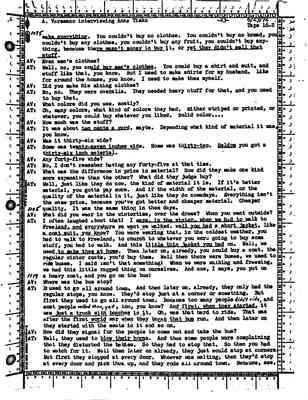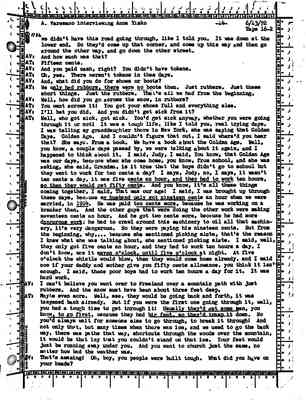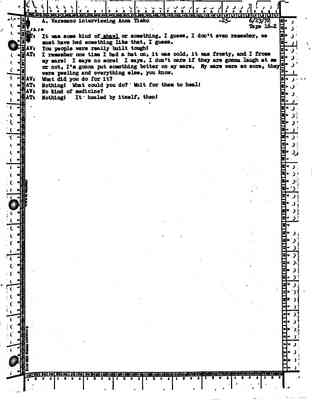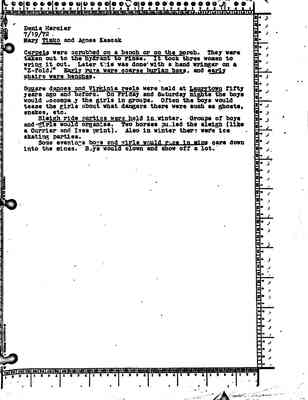Pages
78
A. Varesano interviewing Anna Timko -236/23/72 Tape 16-2
1095 make everything. You couldn't buy no clothes. You couldn't buy no bread, you couldn't buy any clothes, you couldn't buy any fruit, you couldn't buy anything, because there wasn't money to buy it, or yet they didn't sell that stuff.
AV: Even men's clothes?
AT: Well, no, you could buy men's clothes. You could buy a shirt and suit, and stuff like that, you know. But I used to make shirts for my husband. Like for around the house, you know. I used to make them myself.
AV: Did you make his mining clothes?
AT: No, no. They were overalls. They needed heavy stuff for that, and you used to buy that.
AV: What colors did you use mostly?
AT: Oh, many colors, what kind of colors they had. Either striped or printed, or whatever, you could buy whatever you liked. Solid color.....
AV: How much was the stuff?
AT: It was about ten cents a yard, maybe. Depending what kind of material it was, you know.
AV: Was it thirty-six wide?
AT: Some was twenty-seven inches wide. Some was thirty-two. Seldom you got a thirty-six inch material.
AV: Any forty-five wide?
AT: No, I don't remember having any forty-five at that time.
AV: What was the difference in price in material? How did they make one kind more expensive than the other? What did they judge by?
AT: Well, just like they do now, the kind of material it is. If it's better material, you gotta pay more. And if the width of the material, or the quality of the material in it, just like they do nowadays. Everything isn't the same price, because you've got better and cheaper material. Cheaper 1105 quality. It was the same thing in them days.
AV: What did you wear in the wintertime, over the dress? When you went outside?
AT: I often laughed about that! I says, in the winter, when we had to walk to Freeland, and everywhere we went we walked, well you had a short jacket, like a coat suit, you know? You were wearing tht, in the coldest weather, you had to walk to Freeland, to church to whatever you were going to buy some stuff, you had to walk. And this little thin jacket you had on. Well, we used to make them at home. Then later on, already, you could buy a coat, the regular winter coats, you'd buy them. Well then there were buses, we used to ride buses. I said isn't that something! When we were walking and freezing, we had this little ragged thing on ourselves. And now, I says, you put on 1119 a heavy coat, and you go on the bus!
AV: Where was the bus stop?
AT: It used to go all around town. And then later on, already, they only had the regular stops, you know. They'd stop just at a corner or something. But first they used to go all around town. Because too many people didn't ride, and most people walked then, yet, too, you know? And first, when they started, it was just a truck with benches in it. Oh, was that hard to ride. That was after the first world war when the began that bus run. And then later on they started with the seats in it and so on.
AV: How did they signal for the people to come out and take the bus?
AT: Well, they used to blow their horns. And then some people were complaining that they disturbed the babies. So they had to stop that. So then you had to watch for it. Well then later on already, they just would stop at corners. But first they stopped at every door. Whoever was waiting, then they'd stop at every door and pick them up, and they roade all around town. Because, see
79
A. Varesano interviewing Anna Timko -246/23/72 Tape 16-2
1136 we didn't have this road going through, like I told you. It was down at the lower end. So they'd come up that corner, and come up this way and then go around the other way, and go down the other street.
AV: And how much was that?
AT: Fifteen cents.
AV: And you paid cash, right? You didn't have tokens.
AT: Oh, yes. There weren't tokens in them days.
AV: And, what did you do for shoes or boots?
AT: We only had rubbers, there were no boots then. Just rubbers. Just these short things. Just the rubbers. That's all we had from the beginning.
AV: Well, how did you go across the snow, in rubbers?
AT: You went across it! You got your shoes full and everything else.
AV: I'll bet you did. And you didn't get sick from it?
AT: Well, who got sick, got sick. You'd get sick anyway, whethere you were goin through it or not! It was a tough life, like I told you, real trying days. I was telling my granddaughter there in New York, she was saying that Golden Days. Golden Age. And I couldn't figure that out, I said where'd you hear that? She says, From a book. We have a book about the Golden Age. Well, you know, a couple days passed by, wer were talking about it again, and I happened to think about it. I said, Judy, I said, You know, that Golden Age was our days, because when she come home, you know, from school, and she was asking, she said, Grandma, is it true that the boys didn't go to school but they went to work for ten cents a day? I says, Judy, no, I says, it wasn't ten cents a day, it was five cents an hour, and they had to work ten hours, so they would get fifty cents. And you know it's all these things coming together, I said, That was our age! I said, I was brought up through these days, because my husband only got ninteteen cents and hour when we were married, in 1914. He was paid two cents more, because he was working on a breaker then. And the other guys that were doing the other work were making seventeen cents an hour. And he got two cents more, because he had more dangerous work; he had to crawl around this machinery to oil all that machinery, it's very dangerous. So they were paying him nineteen cents. But from the beginning, why.... because she mentioned picking slate, that's the reason I know what she was taling about, she mentioned picking slate. I said, well, they only got five cents an hour, and they had to work ten hours a day. I don't know, was it seven o'clock, until five o'clock at night. At five o'clock the whistle would blow, then they would come home already, and I said now if your daddy and mother give you fifty cents allowance, you think it isn't enough. I said, these poor boys had to work ten hours a day for it. It was hard work.
AV: I can't believe you went over to Freeland over a mountain path with just rubbers. And the snow must have been about three feet deep.
AT: Maybe even more. Well, see, they would be going back and forth, it was tampened back already. But if you were the first one going through it, well, you had a tough time to get through it! Usually they'd get some men, you now, to go first, because they had big feet, so they'd tamp it down. So you'd always wait for someone else to go through, to break it through! And not only that, but many times when there was ice, and we used to go the back way, there was paths that way, shortcuts through the woods over the mountain, it would be that icy that you couldn't stand on that ice. Your feet would just be running away under you. And you went to church just the same, no matter how bad the weather was.
AV: That's amazing! Oh, boy, you people were built tough. What did you have on your heads?
80
A. Varesano interviewing Anna Timko -256/23/72 Tape 16-2
1210 AT: It was some kind of shawl or something, I guess, I don't even remember, we must have had something like that, I guess.
AV: You people were really built tough!
AT: I remember one time I had a hat on, it was cold, it was frosty, and I froze my ears! I says no more! I says, I don't care if they are gonna laugh at me or not, I'm gonna put something better on my ears. My ears were so sore, they were peeling and everything else, you know.
AV: What did you do for it?
AT: Nothing! What could you do? Wait for them to heal!
AV: No kind of medicine?
AT: Nothing! It healed by itself, then!
81
Denis Kercier 7/19/72 Mary TImko and Agnes Kascak
Carpets were scrubbed on a bench or on the porch. They were taken out to th hydrant to rinse. It took three women to wring it out. Later this was done with a hand wringer on a "Z-fold." Early rugs were coarse burlap bags, and early chairs were benches.
Square dances and Virginia reels were held at Laurytown fifty years ago and before. On Friday and Saturday nights the boys would accompany the girls in groups. Often the boys would tease the girls about what dangers there were such as ghosts, snakes, etc. Sleigh ride parties were held in winter. Groups of boys and girls would organize. Two horses pulled the sleigh (like a Currier and Ives print). Also in winter there were ice skating parties. Some evenings boys and girls would race in the mine cars down into the mines. Boys would clown and show off a lot.



